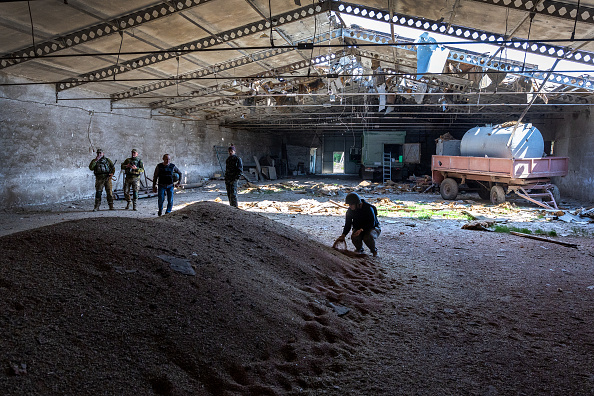The lack of space for this year’s grain is another hard blow to war-torn Ukraine

As hot weather hits Europe, it’s time for those who are still able to farm in Ukraine to start this year’s harvest. Even amidst a renewed, brutal Russian offensive, farmers have to choose between going bankrupt or picking up this year’s crops despite the risks. Most choose the latter. Letting the crops rot under the ground isn’t really an option.
But there is no space for this year’s yield. An estimated 22 million tons of grain are currently sitting in silos all over Ukraine. In normal times, they would have been exported, but almost all commercial ports up and down the country are under blockades. The main port of Odessa has been closed since February. To the question “where has the grain gone?”, the answer is: nowhere. On top of that, it is estimated that around one fifth of the silos in Ukraine have been destroyed during the war, leading to diminished storage capacity.
Ukraine and its international allies have approximately three months to find a way to make space for the new yield before this year’s harvest is completed. It could go up to 60 million tons of fresh produce.
The most intuitive way to make room for these high volumes would be to export as much as possible of last year’s harvest through alternative routes. But where from?
Arthur Nitsevych, a partner at Interlegal Law Firm in Odessa, is seeing it unfold in front of his eyes. He says the only two ports currently open, Izmail and Reni, are both small continental ports located on the Danube River, lacking the necessary infrastructure to export big quantities of grain. Another option could be to load trains with the grain and send them to ports in neighbouring countries, like Constanta in Romania or Gdansk in Poland, whose infrastructure could cope with the volumes. But in this case it’s the railways that are not ready. “It’s just a bottleneck”, sighs Nitsevych.
What else can be done? President Biden has suggested building temporary silos on the border between Ukraine and Poland, but these could store only a small percentage – probably around 10 per cent – of the total quantities.
Another idea is to use silo bags – huge plastic bags that preserve the grains for months. Argentinian farmers use them frequently when the exchange rate is not favourable or export taxes are inconvenient to preserve their crops and wait for a better time, says Carlos Mera, Head of Agri Commodities Market Research at Rabobank. “But that’s mainly for soy, which is easier to store in silobags than corn and wheat”, he adds. Another problem is that silo bags are becoming expensive – as Ukrainian farmers increasingly use them, their price has skyrocketed since the outset of the war.
The real deal, many point out, would only be reached by reopening the Odessa port. Several countries, including the UK, have said they’re willing to provide their expertise and technology to de-mine the Black Sea. The reason why it hasn’t been done yet, is that it represents a considerable security risk. “Who’s going to guarantee us that after de-mining Russia is not going to send the troops to land into Ukraine?”, asks Nitsevych. Given Russia’s record of broken promises and breaches of international law, some suspicion is hard to dispute.
Turkey is currently attempting to broker a deal to unlock the shipment of grain from Odessa. President Recep Tayyip Erdoğan has been saying that a deal is close. It would create safe corridors in the Black Sea without the need to de-mine waters, with the protection of a third-party – potentially Turkey itself. This plan will depend on whether Russia finds incentives to allow a breakthrough to the impasse. After all, the Kremlin is being very successful at “weaponizing food”, says Professor Anna Nagurney of the University of Massachusetts Amherst.
Unless a deal on the Black Sea is effectively reached before the end of the month, the best solution will be a combination of different methods – temporary silos, transport via railways and caravans. Logistic companies have sniffed the opportunity and are rushing to try and handle at least part of the grain stuck at port terminals on the very south of the Odessa region, at the border with Romania, says Nitsevych.
In short, when it comes to the wheat crisis, “things are not improving, but they’re not getting worse either”, says Dr Peter Alexander, global food security lecturer at the University of Edinburgh.
Yet the status quo is not enough, given that Putin is scooping the price, watching as the “breadbasket of the world” risks getting slowly destroyed.